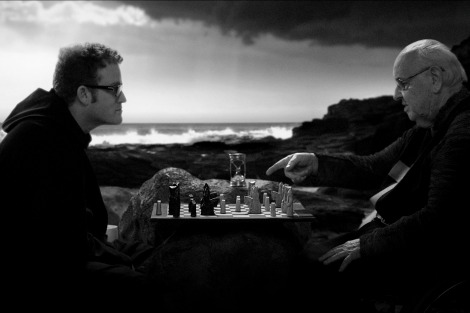Pope Francis notwithstanding, Father Bob Maguire is the closest thing the Catholic Church in Australia has to a celebrity. His authentic manner and dedicated work with the homeless in the community surrounding his former parish, Saints Peter and Paul's in South Melbourne, over the course of decades, have earned him many admirers both within and outside the Church. His aptitude at engaging with the media and in recent years his regular Triple J radio show with John Safran, has earned him a deeply committed fanbase, especially among young Australians.

The cult-like nature of his following is acknowledged in the title of this documentary by Melbourne filmmaker Milburn, which follows Bob during the years following his forced retirement from Saint Peter and Paul's, and captures some of the community outrage at the decision, and Bob's own ultimately unsuccessful resistance to it.
Senior members of the hierarchy, including Denis Hart, the Archbishop of Melbourne who requested Fr Maguire's retirement, and George Pell, Archbishop of Sydney, with whom Bob has had run-ins related to the clergy sexual abuse crisis, are cast as authoritarian villains against whom Bob the cage-rattling hero must rage. Hart and Pell are all but absent from the film, having declined to be interviewed, which frees Milburn to frame this as an unequivocal tribute to a man whom she clearly admires. She casts Bob as a prophet, and presents a compelling case for that description.
The film opens with a monologue in which Bob distills thousands of years of Judeo-Christian tradition into a single, gripping manifesto, explaining in profoundly casual language how Christianity grew from a grassroots movement based in grace and self-sacrifice into an institution concerned with power and wealth, steeped in clericalism, and susceptible to corruption. He recalls the Second Vatican Council of the 1960s as nothing less than a revolution, which sought to even out the Church's power structures and to open up a Church that had become stodgy and self-referential. The revolution, though, has since been stymied.
This monologue sets the tone for the film, as Bob takes the 'invitation' to retire as an example of the over-extension of power by the hierarchy, and a rejection of his outspoken manner and unconventional methods, regardless of his pastoral intentions. Bob here is cast in a similar mould to Peter Kennedy and Bill Morris, those other earthy Australian clerics who according to the popular narrative were suppressed by the hierarchy for flouting outdated practices while attempting to find ways to be more inclusive. This is an appealing narrative for a secular public that has become disillusioned with institutional religion, especially due to the sexual abuse crisis and inequitable practices regarding marriage and the role of women within the hierarchy.
Whatever the rightness or otherwise of the Church's treatment of Bob, there is no questioning his passion for the poor, and his unshakeable belief that it is for the poor that Christians are called to work. He reflects at length on these matters, in his utterly compelling, laconic fashion, his monologues laced with irreverance, razor wit, and the kind of pithy, profound hyperbole that sits well with the 'prophet' label: 'You don't want to mess with the Roman Church ... You've got this clash of cultures between, "What would Jesus do?", and "What would the Roman Pope do?" ... It's a Roman phenomenon. They've got to find some mechanism for dealing with dissidence.'
'For him being a priest entails getting his hands dirty, giving everything of himself, and doing what he thinks is right, even if doing so upsets power structures; especially if it upsets power structures, if they have contributed to the plight of the downtrodden.'
A framing device in which Bob sits on a monochromatic beach, engaging in scripted conversation with a black-cowled Safran over a game of chess, is too contrived to be entirely successful. In one instance Bob recoils from the vision of a cross that appears in the sky above the horizon, gasping 'The devil!' The point, that he might associate this stylised, clean and straight-lined icon with the 'evils' of clericalism and power within the capital-C Church, is perhaps hammered home a little too heavily here.
But this moment does help to illuminate by contrast the ostensibly less pristine symbols that Bob discovers through his interactions with society's downtrodden; notably with Costas, a former street kid who wanders in and out of Bob's home and with whom Bob shares an easy, conversational intimacy, as fatherly as it is friendly. This subplot produces what are easily the film's most touching and profound moments, and reveal the depths of Bob's authenticity and compassion even more so than any of his compelling speeches.
For Bob, the clean, straight edges of that looming, luminous cross don't accurately reflect the authentic role of the church in this world. For him being a priest entails getting his hands dirty, giving everything of himself, and doing what he thinks is right, even if doing so upsets power structures; especially if it upsets power structures, if they have contributed to the plight of the downtrodden. That certainly sounds prophetic to me.
This article originally appreared in Eureka Street in 2013.
Tim Kroenert is the former editor of Eureka Street.